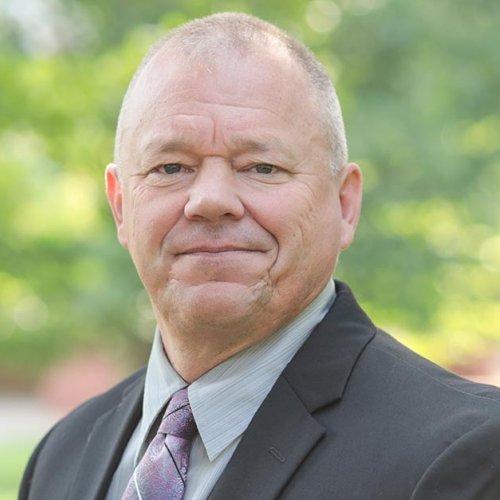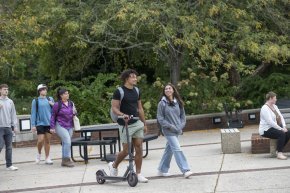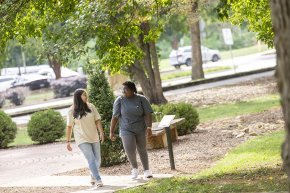
Public Safety: Behind the scenes
Claremont, North Carolina native and veteran police officer Randy Isenhour became director of public safety at Lenoir-Rhyne University in August 2024. His distinguished 28-year career with the Hickory Police Department has equipped him with the experience and knowledge to build a more secure campus community.

Q: What made you want to move from the Hickory Police Department and come to LR?
A: In March of 2024 I became eligible to retire from the police department, and around that time, I got a call from Norris Yoder, who was my predecessor here at LR. He told me he was planning to retire from LR and I’m still pretty young, so I didn’t want to stop working altogether.
I also knew I wanted to stay in a similar field – in the protective role. A lot of officers, when they retire, want to get as far away from anything remotely similar to law enforcement, but that's not me. I still enjoy it, and I feel like it’s what I’m good at. With my retirement lining up with Norris’ – it kind of felt like I was meant to be here. I felt like LR was a place I could connect with people and make a positive difference.
Q: Since you’re from the Hickory area, you’re already familiar with LR, but can you describe your impressions of Lenoir-Rhyne now that you’re part of the campus?
LR is a really strong community. It's all about the people – the students, staff, faculty, and the administration.
I guess the clearest change from what I'm used to from 28 years in law enforcement is how the students are always friendly and respectful. In the Hickory area, law enforcement has a good relationship with the larger community, but it’s the nature of the profession that we end up dealing with the same five percent of the population 90 percent of the time. And because of the nature of what that five percent is doing to draw our attention, they’re definitely not friendly or respectful on a regular basis. Being here is a nice change.

Q: What makes you a good resource in a crisis?
First and foremost a person in my position needs to take control and remain calm. As a leader, you’re setting the tone for everyone around you, so if I’m not calm, people are going to feed off that. So, if I am panicking and not making proper decisions, the people around me are more likely to behave in the same manner. Whereas if I stay calm and I'm in control and I'm doing what needs to be done, seeing that other people are doing what they need to get done, and keep them on task to get through the crisis with as little damage as possible. Once people are safe, then we can move into the logistics of what happens next.
The worst scenario we prepare for is an active shooter. I’ve done a lot of instruction with law enforcement groups and departments on rapid deployment and readiness in terms of fitness and skill. In that situation, the primary goal is keeping the public safe, moving people away from the threat and keeping them away while working to subdue the threat.
I think about lots of worst-case scenarios and plan for them. Then we work to make sure the staff, faculty, students and everyone else on campus are educated and prepared for crisis, so everyone has at least a rough plan for what they would do in a given emergency. If you’ve roleplayed in your head what you’ll do if something happens, then you're less likely to freeze up and hesitate if it actually does happen. Maybe it’s the first time that the crisis has happened in real life, but you don't want to be the first time you’ve thought about it.
Q: What does an ordinary, non-crisis day on the job look like for you?
A: Hopefully every day is a regular non-crisis day. We patrol the area, either on foot or in golf carts. We get out and about as much as possible, so we can see something that might suspicious or unsafe before it becomes an issue and affects or injures a member of the campus community. That includes suspicious-looking people, but also physical hazards like open drain covers or downed power lines. Depending on the situation, we may involve public works or law enforcement.
Fortunately, we don’t have a lot of hazards where we need to get involved. A lot of our standard calls are people who have locked themselves out of their dorm rooms or vehicles. We issue student identifications and parking decals. A lot of our routine is enforcing parking rules. If a student has a parking decal, then it’s our job to make sure they can use that decal – it’s only fair that the people who make up this campus are able to park in the areas that are designated for them.

Q: What advice can you offer students about keeping themselves safe and secure around campus?
A: In every presentation I do with civilians I always like to say this, “At the end of the day, your safety is your responsibility.”
It’s not 100 percent of the time, but you can avoid a lot of unsafe situations by making good decisions and surrounding yourself with people who also make good decisions.
In general, it’s also good to stay alert and stay aware of your surroundings. If you’re looking at the ground or at your phone, you’re not aware. A thief, for example, is going to for the easiest target –the person who isn’t paying attention to their surroundings or belongings.
And lastly, trust your instincts. If something doesn’t look right or feel right, there’s a good chance it’s not. Do what you need to do to stay safe, and don’t be afraid to call us if you need help. You’re not bothering us. Helping you is what we’re here to do.

